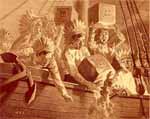Activity 1: Skills and Best Practices
Simulation
Simulations are learning experiences that enable students to participate in a simplified representation of the social world. Simulations differ from classroom games.
Games often involve activities in which there is a competition to get correct answers. Examples of games include spelling bees and competitive drill activities.
Simulations, on the other hand, allow students to understand a process through participation in that process. In most simulations, students take on roles and have specific objectives to accomplish. In order to accomplish their goals, students use resources provided and make decisions about how those resources should be used.
Simulations are complex learning activities. Most research suggests that simulations are about as effective as conventional classroom techniques in teaching subject matter. Simulations are more effective in helping students retain knowledge learned as part of the simulated experience.
Research suggests that simulations are more effective than traditional methods in developing positive attitudes toward academic goals.
Simulations are also motivating for students. Frequently students express satisfaction with participation in simulations and are excited about the learning that took place. Students connect with simulations because the simulations deal with real questions and issues.
Journal articles and other information about simulations can be found at: http://www.ericfacility.net/teams/search

 Module Menu
Module Menu Printable View
Printable View